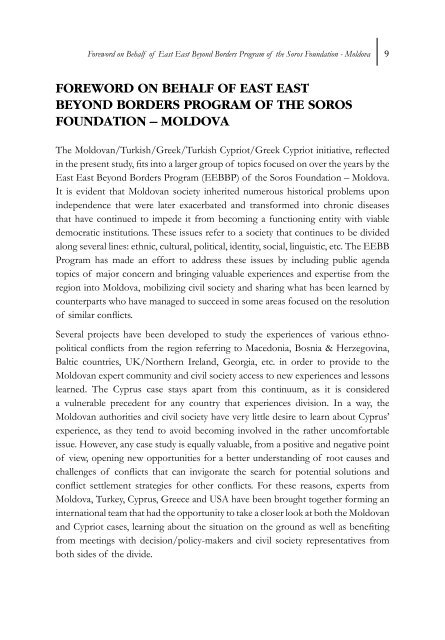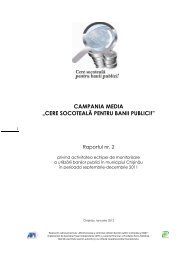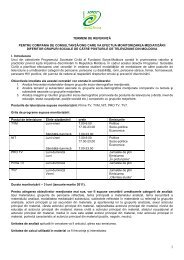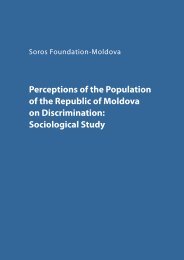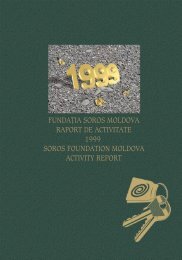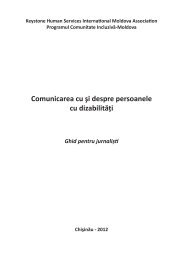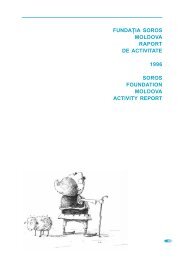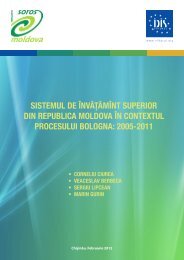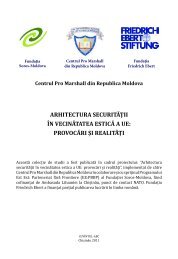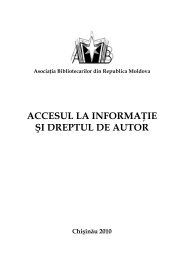Managing Intractable Conflicts: Lessons from Moldova and Cyprus
Managing Intractable Conflicts: Lessons from Moldova and Cyprus
Managing Intractable Conflicts: Lessons from Moldova and Cyprus
Create successful ePaper yourself
Turn your PDF publications into a flip-book with our unique Google optimized e-Paper software.
Foreword on Behalf of East East Beyond Borders Program of the Soros Foundation - <strong>Moldova</strong><br />
9<br />
FOREWORD ON BEHALF OF EAST EAST<br />
BEYOND BORDERS PROGRAM OF THE SOROS<br />
FOUNDATION – MOLDOVA<br />
The <strong>Moldova</strong>n/Turkish/Greek/Turkish Cypriot/Greek Cypriot initiative, reflected<br />
in the present study, fits into a larger group of topics focused on over the years by the<br />
East East Beyond Borders Program (EEBBP) of the Soros Foundation – <strong>Moldova</strong>.<br />
It is evident that <strong>Moldova</strong>n society inherited numerous historical problems upon<br />
independence that were later exacerbated <strong>and</strong> transformed into chronic diseases<br />
that have continued to impede it <strong>from</strong> becoming a functioning entity with viable<br />
democratic institutions. These issues refer to a society that continues to be divided<br />
along several lines: ethnic, cultural, political, identity, social, linguistic, etc. The EEBB<br />
Program has made an effort to address these issues by including public agenda<br />
topics of major concern <strong>and</strong> bringing valuable experiences <strong>and</strong> expertise <strong>from</strong> the<br />
region into <strong>Moldova</strong>, mobilizing civil society <strong>and</strong> sharing what has been learned by<br />
counterparts who have managed to succeed in some areas focused on the resolution<br />
of similar conflicts.<br />
Several projects have been developed to study the experiences of various ethnopolitical<br />
conflicts <strong>from</strong> the region referring to Macedonia, Bosnia & Herzegovina,<br />
Baltic countries, UK/Northern Irel<strong>and</strong>, Georgia, etc. in order to provide to the<br />
<strong>Moldova</strong>n expert community <strong>and</strong> civil society access to new experiences <strong>and</strong> lessons<br />
learned. The <strong>Cyprus</strong> case stays apart <strong>from</strong> this continuum, as it is considered<br />
a vulnerable precedent for any country that experiences division. In a way, the<br />
<strong>Moldova</strong>n authorities <strong>and</strong> civil society have very little desire to learn about <strong>Cyprus</strong>’<br />
experience, as they tend to avoid becoming involved in the rather uncomfortable<br />
issue. However, any case study is equally valuable, <strong>from</strong> a positive <strong>and</strong> negative point<br />
of view, opening new opportunities for a better underst<strong>and</strong>ing of root causes <strong>and</strong><br />
challenges of conflicts that can invigorate the search for potential solutions <strong>and</strong><br />
conflict settlement strategies for other conflicts. For these reasons, experts <strong>from</strong><br />
<strong>Moldova</strong>, Turkey, <strong>Cyprus</strong>, Greece <strong>and</strong> USA have been brought together forming an<br />
international team that had the opportunity to take a closer look at both the <strong>Moldova</strong>n<br />
<strong>and</strong> Cypriot cases, learning about the situation on the ground as well as benefiting<br />
<strong>from</strong> meetings with decision/policy-makers <strong>and</strong> civil society representatives <strong>from</strong><br />
both sides of the divide.


